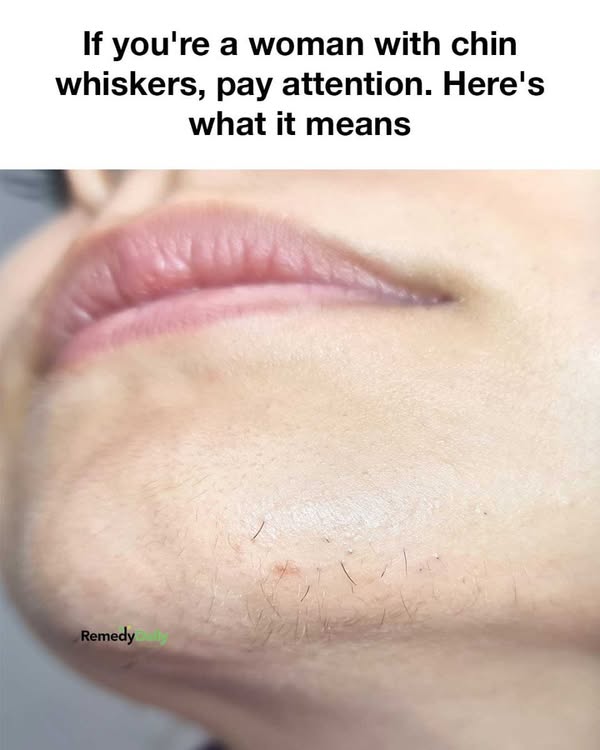Chin whiskers are a common and natural experience for many women, though they can often become a source of stress or self-consciousness. These facial hairs vary significantly in color and texture, ranging from soft, light strands to thicker, darker ones. For some women, it may be just one or two stray hairs that occasionally show up, while others may deal with more noticeable and frequent growth. Understanding why chin whiskers appear and how to manage them is key to feeling confident and in control.

While facial hair in women is entirely normal, its development can be influenced by a variety of factors such as hormones, genetics, and certain medical conditions. The growth of chin hair, like all body hair, follows a cycle made up of three main phases: the anagen or growth phase, the catagen or transitional phase, and the telogen or resting phase. The hormone group known as androgens, which includes testosterone, plays a major role in regulating this cycle. Women naturally produce small amounts of androgens, but an increase in production or heightened sensitivity to these hormones can cause facial hair to grow more prominently. Genetics also have a strong influence on the distribution and thickness of hair follicles, meaning that if women in your family have chin whiskers, you might be more likely to develop them as well. One of the most common causes of chin whiskers is hormonal imbalance.
Conditions such as polycystic ovary syndrome (PCOS) often lead to higher levels of androgens, which can trigger excessive hair growth in patterns typically seen in men, a condition known as hirsutism. Menopause is another time when women may notice more chin hair due to dropping estrogen levels and shifting hormone balance. Some medications, including hormone therapies or certain birth control pills, can also contribute to these changes. Your genetic makeup plays a significant role too—women of Middle Eastern, Mediterranean, and South Asian descent are more likely to experience facial hair due to inherited traits.
Additionally, several medical conditions beyond PCOS can cause unwanted hair growth. These include Cushing’s syndrome, adrenal gland disorders, hypothyroidism, and even hormone-secreting tumors. Sudden or unusually thick facial hair should be discussed with a healthcare provider, especially if it comes with symptoms like irregular periods, acne, or unexpected weight gain. These signs may prompt blood work to test hormone levels or imaging to evaluate the ovaries and adrenal glands. The emotional and psychological effects of chin whiskers can be substantial. Women often feel embarrassed, anxious, or frustrated about having to manage facial hair. The time, money, and effort spent on hair removal can also add up, creating additional stress. Some may begin avoiding social interactions or develop negative body image and self-esteem issues. In more severe cases, this ongoing struggle can contribute to anxiety or depression.
@realronsina Don’t worry about my chin hair! #realronsina #fypシ #fyppppppppppppppppppppppp #comedian #chinhair #tiktokpartner ♬ original sound – Real Ronsina
Fortunately, there are a variety of methods available to manage chin whiskers. Temporary solutions like shaving, tweezing, waxing, or using depilatory creams are easy to access and affordable but require regular upkeep. For more lasting results, laser hair removal and electrolysis are options that target hair follicles directly to reduce or stop hair growth over time. Prescription treatments like topical eflornithine cream can also help slow down the rate of hair growth. The best method depends on your skin’s sensitivity, your budget, and how much maintenance you’re willing to commit to. If irritation or scarring is a concern, seeing a dermatologist can be very helpful. For women seeking more natural approaches, lifestyle changes may support hormone balance and reduce hair growth. Maintaining a healthy weight is especially important for those with PCOS. Eating a balanced diet rich in whole grains, fruits, and vegetables supports hormonal health, and drinking spearmint tea has been shown in some studies to reduce androgen levels. Managing stress through yoga, meditation, or mindfulness practices is also beneficial, as stress can contribute to hormone fluctuations. In the end, dealing with chin whiskers is a highly personal experience. Some women may choose to remove them regularly, while others may embrace them as a normal part of life. What matters most is making a decision that feels right for you and supports your confidence. Remember, you’re not alone—many women face the same concern, and there are resources, treatments, and communities available to support your well-being.





